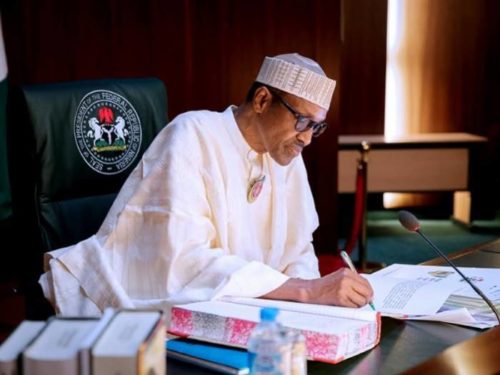
President Muhammadu Buhari, has given his assent to the Suppression of Piracy and other Maritime Offences Bill 2019 and eight other bills passed by the 8th National Assembly.
The Presidential assent, dated June 24, 2019, followed the passage of the anti-piracy bill by the Senate and House of Representatives on April 9, 2019 and April 30, 2019, respectively.
President Buhari, however, rejected 17 other bills passed by the 8th National Assembly.
The Senior Special Assistant to the President (Senate), Ita Enang, who disclosed this to journalists at a news conference in Abuja on Wednesday, said the President decided not to communicate to the 9th Assembly on the rejection of the bills because it lacks powers to take any decision on them.
Enang, however, promised to engage the leadership of both chambers on the rationale behind the rejections of the 17 bills.
The other eight bills assented to by president are the Police Trust Fund Act, Nigeria Natural Medicine Establishment Act, FCT Management Board and Health Insurance, Institute of Transport Administration of Nigeria Bill, National Institute of Construction Technology and Management (Establishment) bill.
Others are the National Agricultural Seed Council bill, Agriculture Credit Guarantee Scheme Fund (Amendment) and FCT Primary Healthcare Board.
The rejected bills are the Adeyemi Federal University of Education (Establishment) Bill, Federal University of Education Kano Bill, Alvan Ikoku Federal University of Education Bill, Federal University of Education Zaria, Bill, National Security Agencies Protection of Officers Identity Bill, Federal Capital Territory Emergency Management Agency Bill, Environmental Managers Registration Council of Nigeria Bill.
Others are the Industrial Development Income Tax Act Amendment Bill, Defence Research and Development Bureau Bill, Animal Diseases Control Bill, Good Samaritans Bill, Chattered Institute of Directors of Nigeria Bill, National Institute of Hospitality and Tourism Establishment Bill and Federal University of Wukari (Establishment) Bill.
The rest are the Warehouse Receipt and Other Related Matters Bill, Federal Capital Territory Health Insurance Agency Bill, Nigeria Automotive Industry Development Plant Fiscal Incentive and Guarantees Bill, Nigerian Film Commission Bill and Proceeds of Crime Bill.
The Suppression of Piracy and other Maritime Offences Bill gives effect to the provisions of the United Nations Convention on the Law of the Sea (UNCLOS), 1982, and the International Convention on the Suppression of Unlawful Acts against the Safety of Navigation (SUA), 1988 and its protocols.
With the signing of the bill, Nigeria becomes the first country in West and Central African to promulgate a separate law against piracy.
Some of the significant provisions of the Suppression of Piracy and other Maritime Offences Bill include a distinct definition of piracy and other maritime offences/unlawful acts; punishment upon conviction for maritime crimes; restitution to owners of violated maritime assets or forfeiture of proceeds of maritime crime to the Federal Government; and establishment of a Piracy and Maritime Offences Fund with prescribed sources of funding.
The new law also vests exclusive jurisdiction for the determination of matters under the Act on the Federal High Court. It empowers relevant authorities mentioned under the Act to seize vessels or aircraft used for maritime crimes anywhere in Nigeria and in international waters or in the jurisdiction of any country where the ship is reasonably believed to be a pirate-controlled ship or aircraft.